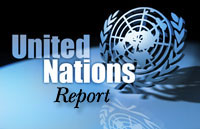- Why does the U.S. government hate Cuba? (FCN, 04-10-2006)
- Bush’s new ‘axis of evil’–Castro and Chavez (FCN, 04-12-2005)
- Black journalists get close-up view of Cuba (FCN, 06-11-2002)

UNITED NATIONS (FinalCall.com) – For the 15th consecutive year, the UN General Assembly adopted a resolution calling for the United States to lift unilateral sanctions against Cuba. Since 1962, the U.S. has maintained an economic, commercial and financial embargo against the nation of Cuba.
The resolution was adopted with a vote of 183 in favor, four against and one abstention. Israel, the Marshall Islands, Palau joined the U.S. in the ‘no’ vote.
Addressing the General Assembly before the vote, Cuban Foreign Minister Felipe Perez Roque said, “The economic war unleashed by the U.S. against Cuba, the longest and most ruthless ever known, qualifies as an act of genocide and constitutes a flagrant violation of international law and the Charter of the United Nations.”
“Throughout these 48 years, the U.S. blockade has caused economic damage to Cuba of over $86 billion. Economic damage this past year was $4.1 billion,” the foreign minister noted. “But more serious than all that is that the U.S. blockade imposes its criminal provisions on Cuba’s relations with other countries that make up this General Assembly,” Mr. Roque added.
“The Bush administration has escalated its actions against Cuba through the so-called Commission for Assistance to a Free Cuba, issuing stricter economic sanctions and increasing reprisals for United States companies trading with Cuba,” he told the world body.
Speaking on behalf of the European Union, Finnish Ambassador Kirsti Lintonen expressed the EU’s opposition to the U.S. sanctions on the Caribbean nation.
“The European Union cannot accept that unilateral measures imposed by the United States on specific countries limit the Union’s economic and commercial relations with third countries, in this case Cuba,” she said.
In 2005, the U.S. ambassador to the UN, John Bolton called the resolution “a complete exercise in irrelevancy.” This year, he was not in attendance, but the rhetoric of the U.S. was more of the same.
“The embargo on Cuba is a bilateral issue and, as such, should not come before the General Assembly,” stated the U.S. representative, Ronald Godard.
Washington’s embargo did not, as the resolution suggested, interfere with navigation in Cuban waters, or prevent others from trading with Cuba, the U.S. delegate added. “The United States would vote against the draft resolution and would encourage all delegations that supported the human rights and transition to freedom for the Cuban people to do the same,” said Mr. Godard.
Speaking in exercise of the right of reply, Mr. Roque said the inhumane increase in aggression against his nation reflected the “frustration” of the current U.S. administration after its efforts to undermine the will of the Cuban people had failed.
“Indeed, undermining Cuba had become an obsession in the American center of power. But, the United States was not–and could not–be a judge. The Cuban people would continue to fight for their freedom,” he insisted.
Representing Syria, Bashar Ja’Afari said the embargo imposed on Cuba had established a precedent for the unilateral behavior of nations outside the framework of international law. “Cuba’s people have a right to freely select their political, economic, social and cultural systems,” the Syrian delegate stressed.
The Indonesian delegate, Prayono Atiyanto said his nation had a long-standing position against the embargo. The principles of non-intervention must be respected and upheld, he maintained. “The embargo presents a major impediment to the right of development of sovereign nations,” Mr. Atiyanto said.
Hossein Gharibi of Iran said the September 2006 Summit of the Non-aligned Movement held in Cuba had called upon the U.S. to put an end to the embargo against Cuba. Resorting to embargo as a tool to achieve political objectives undermined the collective efforts of the Member States for achieving economic growth and sustainable development, he added.
Speaking on behalf of the Group of 77 Developing Countries and China, South African, Sabelo Sivuyile Maqungo said the Group called for all nations not to recognize the embargo against Cuba.
Anthony Severin of Saint Lucia, speaking on behalf of the Caribbean Community (CARICOM), aligned himself with the statement made on behalf of the Group of 77 and China. The embargo only served to generate concern, disquiet and discomfort throughout the Caribbean basin, he said. “CARICOM,” he stressed, “reiterates its unwavering support for the right of the Cuban people to self-determination.”












